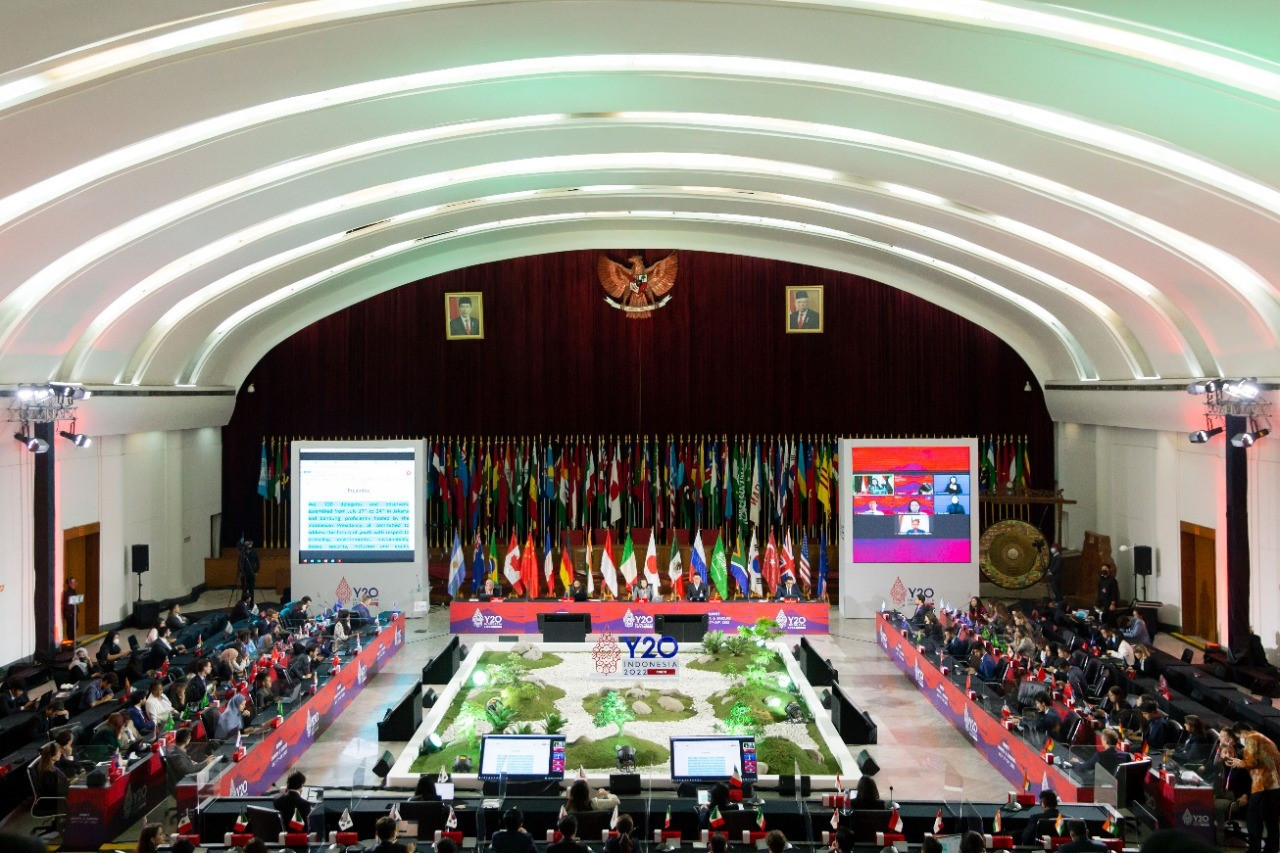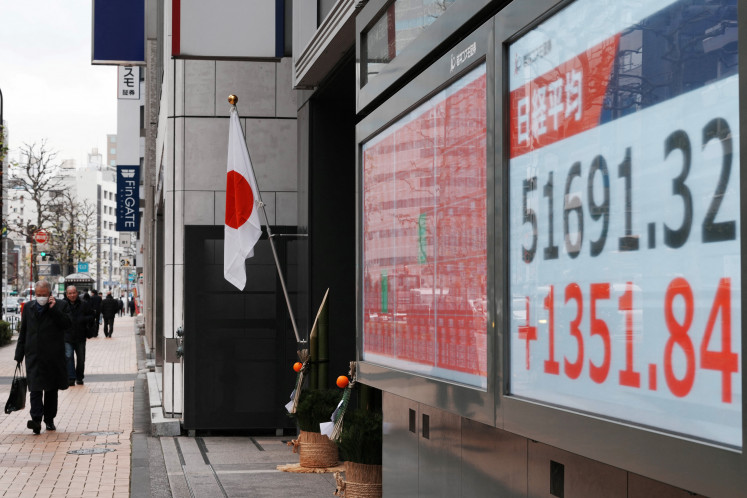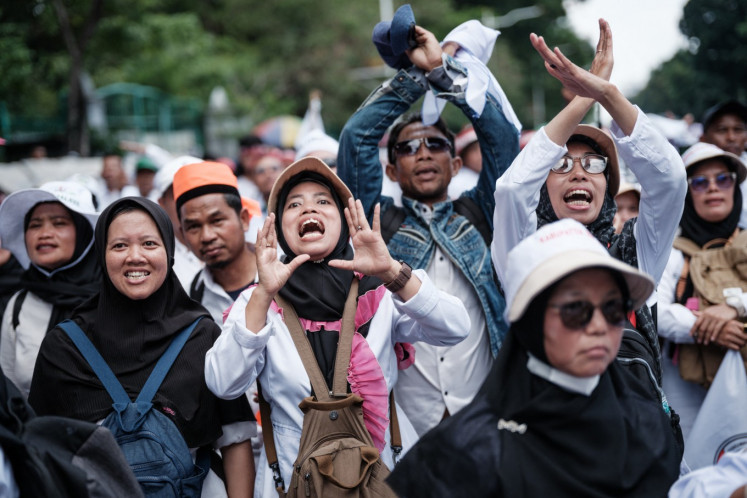Popular Reads
Top Results
Can't find what you're looking for?
View all search resultsPopular Reads
Top Results
Can't find what you're looking for?
View all search resultsBeyond Y20: Paving the way for meaningful youth engagement
For the past 13 years, young people have been involved in the official Group of 20 processes through the Youth 20. Youth delegates of each member country and observers are given the chance to collaborate, negotiate, deliver and amplify their concerns and priorities to G20 leaders through a policy recommendation document,
Change text size
Gift Premium Articles
to Anyone

For the past 13 years, young people have been involved in the official Group of 20 processes through the Youth 20. Youth delegates of each member country and observers are given the chance to collaborate, negotiate, deliver and amplify their concerns and priorities to G20 leaders through a policy recommendation document, known as the Y20 Communiqué. Delegates and representatives have also been invited and consulted in G20-related meetings.
With the conclusion of the recent G20 Youth Summit, where 80+ youth delegates convened to negotiate and collaborate in seeking common solutions to the most critical intergenerational issues facing humanity, the need for diverse perspectives and roles in decision making has never been thrown in sharper relief. In a year wracked by geopolitical conflicts, economic turmoil and planetary deterioration, the youth of the G20 have been able to achieve consensus amid diverse priorities, an outcome thus far deemed unfeasible at many G20 meetings.
However, the Summit itself does not resolve calloused systemic challenges in scaling equitable youth engagement. What does it take to meaningfully engage young people? How can we galvanize truly systemic and sustainable processes? The G20 has taken steps in involving young people in its decision-making processes. Yet we must go further. It remains paramount to eradicate barriers to ensure youth voices and agency are respected and accounted for at all levels, on all issues, and in all areas and mechanisms of decision-making.
To maintain and advance the institutionalization of systemic youth engagement processes, Y20 delegates, in collaboration with the United Nations in Indonesia, have come up with the following recommendations.
First, G20 governments should deliver on national action plans for youth inclusion.
With any commitment, there needs to be an actionable plan laying out its delivery.
Y20 delegates call on G20 governments to conduct national and sub-national gap analysis and subsequently deliver National Action Plans on youth engagement that identify and address the challenges youth face in society. This includes social, economic, political and cultural barriers that limit their meaningful participation and engagement. The process and deliverables of this must be co-designed with and co-owned by youth.
The need for such an embedded strategy is accentuated by the climate crisis. The UN Special Rapporteur on the promotion and protection of human rights in the context of climate change (Report A/77/226) finds the “participation disconnect” of those that continue to support the fossil fuel economy and those that are most affected by the impacts of climate change. Undoubtedly, youth is one of the latter groups, despite the reality that without youth activism and advocacy, no government would have committed to net zero in an attempt to save our planet.
Public participation – especially that of marginalized communities – remains a fundamental pillar of instrumental or procedural rights. Young people are inheriting an inherently hotter world, a world mourning climate-induced losses and damages, a world that is yet to have coordinated support to respond and rebuild from such crises (and their knock-on impacts).
But safeguarding our climate and environment is just one issue (albeit a critical one underpinning our survival) that implicates the current and future generation. Youth inclusion must be massive, equitable and systemic: the enablement of which warrants, firstly, a plan that delineates where we are at, where we need to get to and how we get there.
Second, G20 governments should remove systemic barriers.
While we celebrate the impact global youth have made on key issues, it is nevertheless important to reckon with key questions: For whom is the youth agenda and who gets to shape it? How do we establish institutionalized – as opposed to ad hoc – means of political, social and cultural participation of youth in the long term, particularly youth from marginalized communities?
Case in point: the discussions surrounding legislation on digital transformation often leave out young people, despite young people being the segment of the population that will be the most impacted not only today, but in the years to come. Young people are rarely included in the consultations on personal data protection, central bank digital currency, crypto-assets and artificial intelligence, among others, in the law creation process. Systemic barriers such as lack of digital access, financial compensation and information asymmetry remain roadblocks.
The youth need to be involved in the decisions that impact our future. In a world of rapid digital transformation, we should have a role in the processes of drafting legislation and determining government policy on data privacy, emerging financial technologies, digital currency, digital education and e-government service delivery. Y20 delegates have underscored that youth voices will help ensure that we protect consumers, prioritize mental health, advance equity, increase digital literacy, strengthen citizen participation in government and leave no one behind in the ongoing digital transition across our economies. On a number of these topics, youth are currently not recognized as valued stakeholders – this needs to change.
Y20 delegates ask G20 governments to eradicate asymmetric access to information and engagement opportunities by publicizing information on all policy consultation and youth engagement programs in all schools, academic institutions and community centers, making materials further available in non-institutional, user-friendly, inclusive and age-appropriate language.
Third, G20 governments should enable change among non-youth decision-makers.
Meaningful youth engagement puts youth at the center of decision making, but enabling change necessitates action from all of us, particularly non-youth.
We need both ends of the spectrum to act so as to ensure equal ownership and accountability. The reality remains that youth involvement in decision-making can generate positive influences on adults and organizations. Chronic “gatekeeping” through which youth must grovel to gain opportunities only exacerbates the ubiquitous aforementioned challenges of socioeconomic marginalization.
Y20 delegates ask G20 governments to mandate implicit bias training, re-skilling and capacity-building programs for all non-youth decision-makers, so as to address power imbalances and strengthen inclusive, intentional and mutually respectful decision-making partnerships. Such partnerships should be integrated into the design and delivery of decisions that affect our livelihoods, communities, countries and world.
To go further: Y20 delegates also ask G20 governments to take a tangible action by establishing diverse, inclusive and representative youth delegations to allow youth to participate in all multilateral and public forums, with funded participation and actionable follow-up mechanisms.
This could be through the creation of the UN Youth Delegates Program, which currently only four G20 countries have established (Indonesia is not yet one of them). Globally, the number of countries that have established this program is eerily similar – at about 30 among 193 UN members. The UN General Assembly’s recent adoptions of resolutions on the establishment of the UN Youth Office should create an impetus for countries to go further.
More than a seat at the table, more than placing a checkmark by a tick box, youth engagement should not only be invoked when it benefits the political rhetoric of diversity and inclusion. Meaningful youth engagement is a long journey, and it has started with youth demanding co-ownership to govern our destinies. We have taken the first step, where will you meet us?
Jodi-Ann Jue Xuan Wang is the Canadian Delegate to Y20 Indonesia 2022. Angelo Wijaya is the Head of Project Management, Co-Head of Research, and Head of Y20 Organizers Network at Y20 Indonesia 2022.
Acknowledgement
The authors of this article would like to acknowledge the contributions of Y20 delegates who have greatly contributed to the formulation of this Y20 Policy Recommendation on Meaningful Youth Engagement during the United Nations-Y20 Workshop, including Omar Almutawa (United Arab Emirates), Francesco Brusaporco (Italy), Niel Swanepoel (South Africa), Michaela Chan (United Kingdom) and, in particular, Sameer Esmail (Canada).












